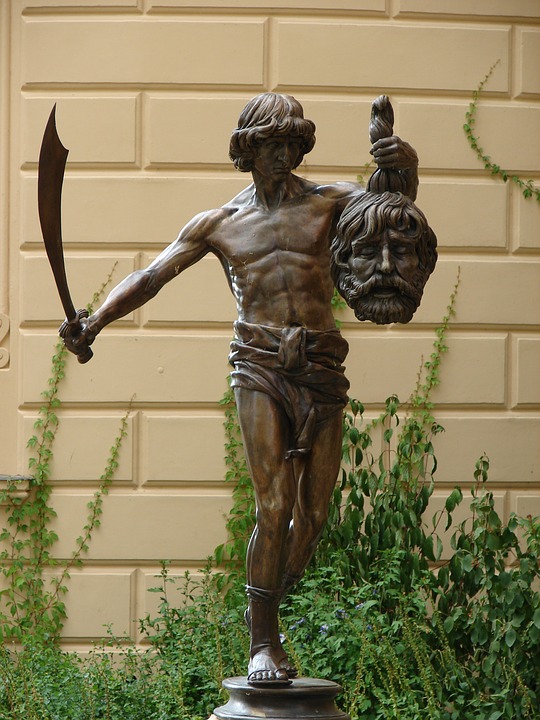


One of the biblical metaphors I love the most envisions Jesus as a shepherd, guiding us, leading us, protecting us. Reflect on this for a moment: it is okay to need guidance. It is okay to desire guidance. No matter how long it has been since you waded in the water, it is okay to need a mentor. Someone you can trust with your most vulnerable self. A person in whose arms you could place your infant self, and know you will be cared for. It’s okay to need people.
Applying this to myself requires me to engage in a bit of come-cleanery: It is a challenge for me to be vulnerable with anybody, sometimes even God. So one thing the tale of David and Goliath (1 Samuel 17: 1-58) does for me is remind of my own need to be vulnerable, and how key it is to hearing the Divine. What if hearing from God requires us to become as vulnerable as sheep are?Sheep need a shepherd. Sheep need someone to guide them. Sheep can’t see very well, and would walk right over the edge of a cliff without a shepherd to guide them. Sheep without a shepherd are likely to walk right in front of a lion whose stomach was growling.
I know sheep language has some negative connotations to it in our 21st century reality. No one wants to be called a sheep, blindly following some charismatic leader around and posting on Facebook what that leader said as though it were annexed to the Bible as the 151st Psalm. Hear me out. Sheep have a lot to say to us about being vulnerable in the safety of someone we can trust, a shepherd that we appointed for ourselves. Shepherds have two basic tools: a rod, and a staff. A staff is a long stick used to keep the sheep on the path. And a rod is a sharpened stick used to discipline the sheep and protect the sheep from predators.
And of course, David was a shepherd. A shepherd boy who was not expected to defeat big, bad, Goliath. He was the underdog. Underdogs aren’t supposed to win, but somehow, they do. This underdog concept is present in the biblical tale of David versus Goliath. This story is so popular–and perhaps the message so important– that it appears in other religious books. The story of David and Goliath also appears in the Koran. So this is a story with appeal to Jews, Christians, and Muslims.
Needless to say, Israel had reason to fear the Philistines. The Philistines had already taken the Ark of the Covenant from them, yes, the actual tablets that Moses carried down Mount Sinai. Think about how it feels when you have lost something sacred. And the Philistines had a long history of taking things from the Israelites because they were fierce warriors. They controlled the metal industry, making them militiamen always ready for battle with custom made swords. The Philistines had chariots made of iron, while Israel’s army was comprised of mostly foot soldiers. The people of Israel were at war with the Philistines, and Saul was the leader of their army.
The Army of Israel was camped in one of the valleys that run from the hills of Judah out into the Philistine plain. The camp of Israel was on the hills on one side of the valley, and the camp of the Philistines was on the other side. There was a green meadow between them, and a brook with a stony bed running through the meadow. Nature’s beauty at its finest…green fields, wind softly blowing the grass, the sound of streaming water…a tranquil scene in the midst of chaos.
And Goliath was the secret weapon of the Philistine army. This great strong man, taller than all the rest, came out toward the camp of Israel and called to them. He was armed with heavy armor on his head and body and legs. The text tells us he wore a helmut of bronze, and wore a coat made of metal. Imagine if you would how the knights of the roundtable looked, with their suits of armor. Goliath carried a great sword and spear, and a man with a shield went before him. It was a custom in the ancient world to allow battles to be decided by just two men, two soldiers battling each other for the victory as opposed to a “Wakanda forever” type of battle scene. So Goliath called to the army of Israel to send out a man to fight with him; if Goliath killed him, the people of Israel would serve the Philistines; if Goliath were killed, the Philistines would serve Israel. Goliath was big, strong, and arrogant. The men of Israel and Saul were afraid. Each morning and evening for forty days Goliath came and called Israel out, as my father would say, selling wolf tickets. Talking smack and insulting them: “And I hear you only worship one God!”
No one dared to go to fight with Goliath until David came to the camp. He came from his home in Bethlehem; his father sent him to check on the welfare of his three older brothers who were soldiers in Saul’s army. He saw the giant come out from the Philistine camp and heard smack talk, and the soldiers were afraid. But apparently, David wasn’t. He said to Saul, “Let no one’s heart fail because of him; I will go and fight with this Philistine.” And on he went, only a shepherd boy in his shepherd’s garment, with his shepherd’s staff and sling and bag, and he picked five smooth stones out of the brook. Goliath was offended that this kid, this young blood, this homeboy from Bethlehem, came out to fight him. And David ran to meet the Philistine and threw a stone with his sling. It struck the giant in the forehead and he flat fell on his face. David took Goliath’s sword and sliced his head from his body. The army of Israel shouted, and chased the army of the Philistines down the valley. That’s some feel good stuff. But how was David so sure he would win? How was he able to defeat the Philistine giant? What made David so confident? And more importantly, how can we get there? That’ll be the focus of Part Two.
(part 2 will be up tomorrow.)